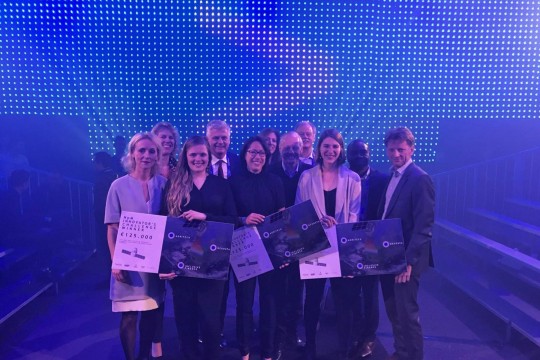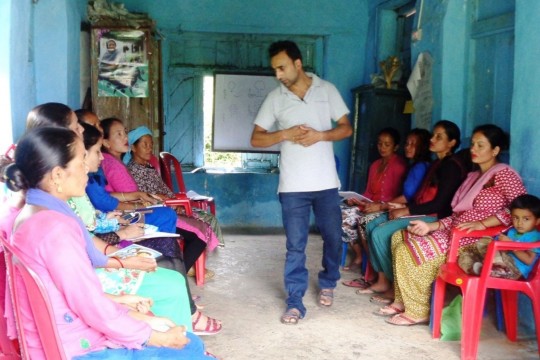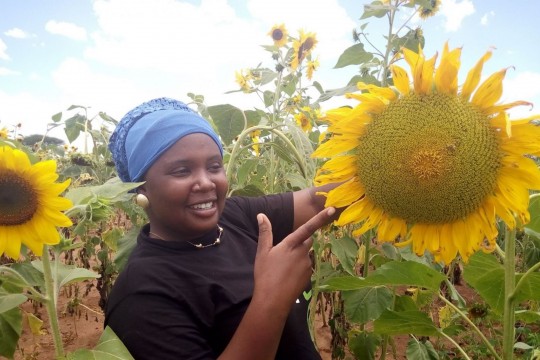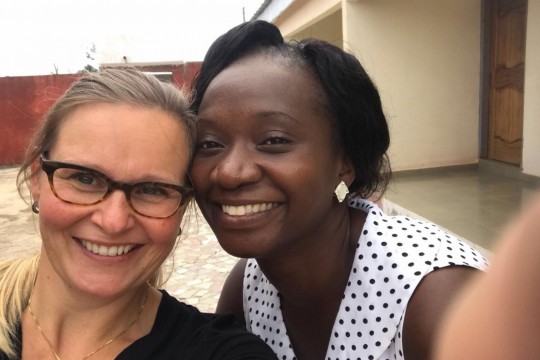Ambassador Tom Sebastian travels in Kenya
Tom Sebastian: “From 22 to 28 August, as ambassador for Vijana Reloaded, I visited several trainees and spoke extensively with them and their families. For three days I immersed myself in the training program here. In the two days beforehand I visited other ICS projects in order to get a good picture of what the organization all does. I attended a skillful parenting course and talked to parents about the traditional roles of men and women and relating to children. They told me what the training gave them and their families. My trousers and shoes were drenched at a recently opened water station in Busia, where dozens of children bounced around us curious about the ‘mzungu’. I harvested corn and talked with a farming family. But my journal is about Vijana Reloaded, the trainees that I met, the pitches that I heard and the big impression this made on me.”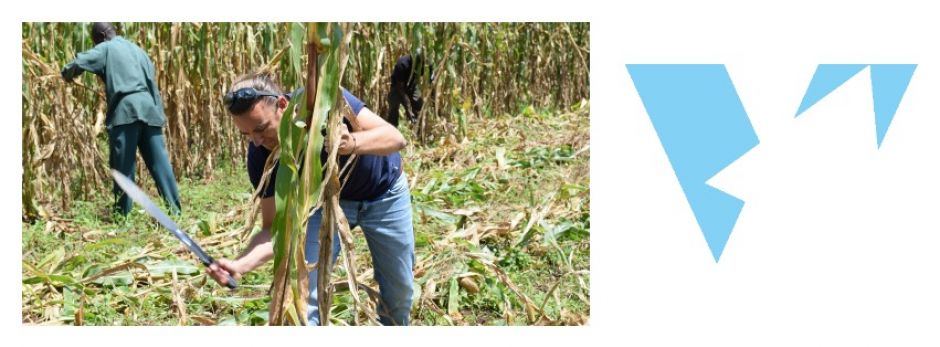
Wednesday, 26 August
Stellah, one of the Vijana Reloaded trainees, is already waiting for us as we bound across the dirt road towards her in our jeep. She takes us through the gateway into the housing compound where she lives with her parents and five brothers and sisters. We are warmly greeted and embraced – a promising start. There are three couches in the small living room, all draped with sheets. I sit down next to Stellah. Communications assistants Neema and Jantien set up their cameras and I start my interview. Stellah is 26 years old and will be completing the Vijana Reloaded training program this week. The goal of her business, Steer Aid Enterprise, is to train as many people as possible in first aid. Her plan is to sell courses to educational institutions, among others. She has been coached over the last six months to refine her business idea and to sharpen her presentation skills. I am impressed by this young woman who is eager to learn. Her idea is different and meets a need as well. She has an eloquent answer to all the questions I fire off. At the end I ask her to present her company to the camera, in a kind of elevator pitch. She is able to tell her story with conviction.
‘We are warmly received. Neither time nor effort has been spared in making guests feel welcome.’
Once it’s all recorded, Stellah tells us how her father, who has been watching from the corner of the room, has supported and motivated her all this time. He tells us how important he feels it is that women become independent and entrepreneurial. The dining table is loaded with lots of good stuff: corn on the cob, cakes, cookies. Neither time nor effort has been spared in making guests feel welcome. Neema and Cynthia, who both work at the local ICS branch, laugh at my surprise. This kind of hospitality is typical in Kenya: no one can leave without having first eaten well. Stellah’s mother is full of praise for Vijana Reloaded. The gratitude of the whole family is heart-warming. I find it moving to see that not only has Stellah herself benefitted so much from everything she has learned over the past months, but that this also strongly influences the circle around her. Stellah is a proud woman and I am convinced that her business is going to be successful. We are warmly seen off by her whole family and head for the hub.
Tomato sauce
The hub is where the trainees get their weekly lessons and where they can come to daily to work. There’s Wi-Fi, coffee and tea, and always someone to help the trainees and answer questions. This afternoon the third group of trainees will be giving their very first elevator pitch. They all started this week. With apprehension and shyness they pitch their idea within a couple of minutes, one after the other, to the group and us. The ideas range from growing tomatoes to make delicious tomato sauce to importing cheap clothing from neighboring Uganda to sell it in Kakamega. The ideas are clearly still new and have not been checked for feasibility, and the trainees still lack persuasion skills in selling their proposals. But then, they’re doing this for the first time. There’s still a lot to learn, and they’ll be working on that in the coming months. 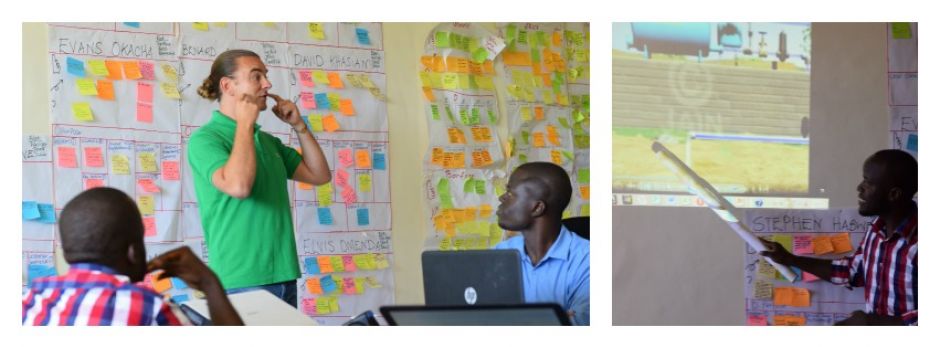
Thursday, 27 August
We start the day at the hub. The second group is presenting their ideas today. This group has been active for two months already and the difference between yesterday’s group and this one is very clear. Ideas have been worked out and are partly being put into practice. Following a set formula they are able to talk about their motivation, the objective of their business, its unique selling point and the income model. The first two presentations are a little boring and evidently the audience is also zoning out. This is due not so much to the content of the presentation but more the presentation technique. I decide to interrupt briefly and demonstrate to the trainees how your voice and gestures can really make a big difference. Look your audience in the eyes, loosen up by walking back and forth and don’t be afraid to make a comment if someone is playing with their phone. The next trainee to give a presentation immediately puts my tips into practice. He starts moving around while talking about his ideas and even comically admonishes another trainee for momentarily not paying attention. I can barely contain my delight. They get it. The remaining trainees also try out the tips and the response and general attention of the listeners has clearly improved.
‘I can barely contain my delight when I see that they get it’
Endless rows of plants
Two home visits are planned again for the afternoon. The last trainee we meet is Plasydia. Plasydia is 28 years old, she has a little girl and lives with her husband in a small mud house in an area full of woods. Plasydia grows trees and provides a variety of gardening services. She takes us around to the side of the house where a bed of tiny seedlings under a net are awaiting their replanting into a pot. On the other side of the house are endless rows of pots, each with a sprig. Fortunately, she doesn’t do this all by herself, her husband helps too. Sitting on a bench anchored between two trees and surrounded by a slew of neighborhood kids, she tells her story to the camera.
Plasydia impresses too, with her will to succeed in her business. She had started a business before but unsuccessfully because she had no idea about how to organize finances. She jumped at the chance to take part in Vijana Reloaded and has pulled out all the stops to make sure this time her business will be a success.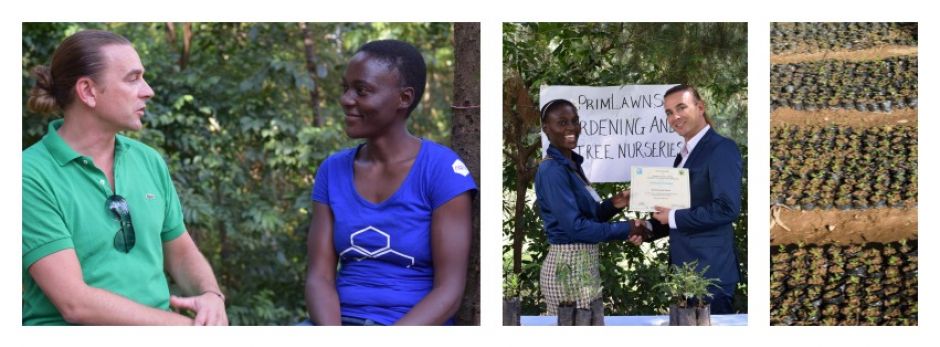
Friday, 28 August
Today is the big day: the first nine trainees have completed their training and are receiving their certificates. A big tent has been set up in the garden of a local hotel. The trainees, their families and many invitees are present. Next to the tent each trainee has a table with more information on their business so that everyone there can stop by for a chat and learn more about their services and plans. Two representatives from the local banks are present to talk with trainees about potential loans. The amounts of money needed are small, compared to what we’re used to, but here 3000 euros is an excellent start-up. People often think you need a lot of initial capital to start a business, but the opposite actually true. ‘Think big, start small’ is Vijana Reloaded’s motto. By involving the banks, Vijana Reloaded facilitates that first contact with financial support for trainees so they can get their plans off the ground.
‘Think big, start small’ is Vijana Reloaded’s motto
Back in the Netherlands
Back on Dutch soil I’ve processed all the encounters and impressions. Reviewing the week in my mind, a couple of things stand out for me. I see that these young people are grabbing the bull by the horns, taking responsibility for building a positive future. They’ve shown me their business plans with great enthusiasm. I’ve seen how each of the trainees is a source of pride for the entire family. The success of a single young person reaches so much farther than one person. They inspire the whole community around them. 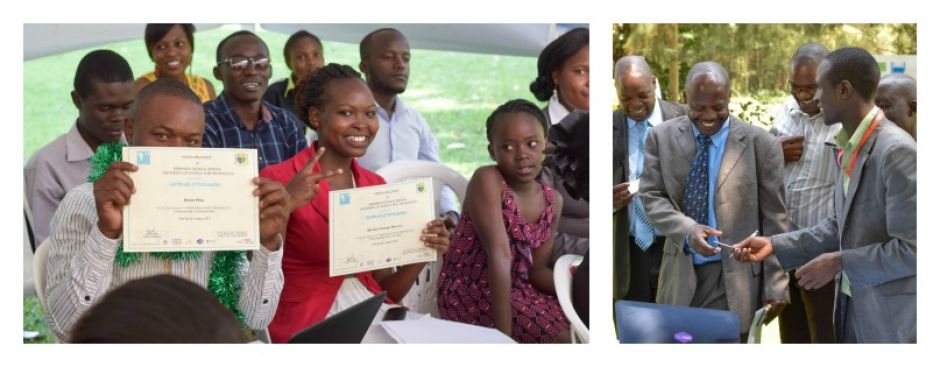
‘Taking a wrong turn every once in a while is part of doing business’
The week had a real impact on me. I am convinced that every trainee I met is going to be successful with their business. Taking a wrong turn every once in while is part of doing business. However, my hope is that all the trainees get all the support they need – both financially and mentally – to make their dreams come true and to give the local economy a boost.

